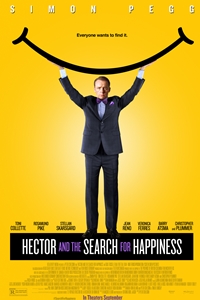 Hector and the Search for Happiness
Hector and the Search for Happiness
Starring Simon Pegg, Rosamund Pike, Toni Collette, Stellan Skarsgård, and Christopher Plummer
Directed by Peter Chelsom
Rated R
Run Time: 114 minutes
Genre: Comedy/Drama
Opens September 26th
By Eric Forthun of Cinematic Shadows
Hector and the Search for Happiness is an optimistic, overlong slog that delivers moments of genuine happiness with a dash of cultural insensitivity and simplicity. As a comedy, its humor ranges from slapstick to character-driven to stereotypical, all sometimes within one scene. As a drama, its scenes are repetitive and follow formulaic notions of how relationships work and where conflict should arise. There’s a growing sense of an identity crisis for the film, eerily mirroring its protagonist, Hector (Simon Pegg). He’s a psychiatrist that seems to be tired of the monotony of his days: his wife, Clara (Rosamund Pike), always makes him the same kind of breakfast to start the morning; he encounters the same patients each day who increasingly complain about the same issues; and he lacks a social life and friends. He has always lived a safe, simple life, so he figures why not complicate things if that means finding himself along the way?
Hector decides to traverse the globe in order to find the secret to happiness, which he believes can be studied and found in particular ways. He logs various explanations throughout his trip, including some on his journey to China where he befriends Edward (Stellan Skarsgård). The film begins a globe-trotting phase where it briskly moves from one setting to the next, assigning an explanation to happiness through wealth and ways of living, amongst others. The story follows Hector as he talks with men at a monastery, travels to India to see their culture and meet with an old friend, and even heads to Los Angeles to meet up with a former flame of his, Agnes (Toni Collette). There is plenty of plot for the film to keep busy with, even if that means providing countless cultural stereotypes along the way. Every country that Hector visits becomes defined by its strange, unsettling nature to him, having foreign characters merely act as vehicles for Hector to develop himself.
The film combines genres and even subgenres of comedy, increasingly becoming disjointed besides some elements striking a strong cord. The slapstick comedy works due to Simon Pegg’s admittedly affecting performance. Pegg has always been a talented comedic actor with the ability to balance dramatic work effortlessly. Here, he makes the most of the material and elevates a grating script into something oddly sweet and touching at times. The best scenes occur on plane trips from country to country, with one in particular having Hector test the breakability of objects in first class after one glass seems indestructible. The problem with these scenes of irreverent, silly humor is that they do not align with the story’s tonally jarring editing. It’s difficult as an audience member to understand what message is being sent throughout most of the film, particularly as scenes change in the moment from touching to shocking to melancholic.
Appearances by Christopher Plummer and Toni Collette in the final act are welcome and inspired, with Rosamund Pike also providing a solid turn in an unfavorable role. Yet the story falls into the trap of spelling out every single one of its themes as if the audience could not fully comprehend the film’s message. It feels belittling, which is even more frustrating as the narrative works well emotionally with its characters. Critics have been bashing the filmas if it’s an uninspired atrocity of filmmaking, and that seems unfair. For every scene that works due to the charm of Pegg and the lightness of Chelsom’s direction, another scene counters with an uneven tone and unpleasant characterizations. Hector and the Search for Happiness has charm and occasional wit, but it’s bogged down by a haphazard tone and overly simplistic storytelling.









